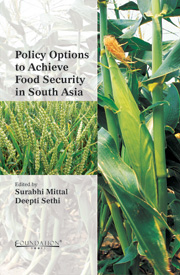Book contents
- Frontmatter
- Contents
- List of Contributors
- Foreword
- Acknowledgements
- List of Abbreviations
- 1 Food Security in South Asia
- 2 Food Security in India: Policies and Options
- 3 Multiple Facets of Food (In) Security in Sri Lanka: An Input to Food Policy
- 4 Food Security in Bangladesh: Achievements, Challenges and Way Forward
- 5 State of Agriculture and Food Security in Pakistan
- 6 Food Security Situation in Nepal: Issues and Suggested Policy Measures
- 7 Food Security in Maldives
- 8 Role of Regional Trade and Rural Development for Food Security in Bhutan
- 9 Food Security in Afghanistan
1 - Food Security in South Asia
Published online by Cambridge University Press: 05 June 2012
- Frontmatter
- Contents
- List of Contributors
- Foreword
- Acknowledgements
- List of Abbreviations
- 1 Food Security in South Asia
- 2 Food Security in India: Policies and Options
- 3 Multiple Facets of Food (In) Security in Sri Lanka: An Input to Food Policy
- 4 Food Security in Bangladesh: Achievements, Challenges and Way Forward
- 5 State of Agriculture and Food Security in Pakistan
- 6 Food Security Situation in Nepal: Issues and Suggested Policy Measures
- 7 Food Security in Maldives
- 8 Role of Regional Trade and Rural Development for Food Security in Bhutan
- 9 Food Security in Afghanistan
Summary
Definition of Food Security
Food security is a complex issue and its definition has evolved over a period of time. The question of food security has various dimensions that go beyond production, availability and demand for food. The initial focus on food security as a global concern was on the volume and stability of food supplies. In the 1974 World Food Summit, food security was defined as ‘availability at all times of adequate world food supplies of basic foodstuffs to sustain a steady expansion of food consumption and to offset fluctuations in production and prices’. In 1983, Food and Agriculture Organisation (FAO) expanded its concept to include vulnerable people securing access to available supplies, stating that food security means ‘ensuring that all people at all times have both physical and economic access to the basic food that they need’. Later, the 1996 World Food Summit redefined food security to take demand, vulnerability and nutritional aspects into account. At the summit, the countries agreed that ‘food security exists when all people, at all times, have physical and economic access to sufficient, safe and nutritious food to meet their dietary needs and food preferences for an active and healthy lifestyle’. In 2002, an FAO Expert Consultation on food security gave a working definition of food security as ‘food security exists when all people, at all times, have physical, social and economic access to sufficient, safe and nutritious food which meets their dietary needs and food preferences for an active and healthy life’.
- Type
- Chapter
- Information
- Publisher: Foundation BooksPrint publication year: 2011



